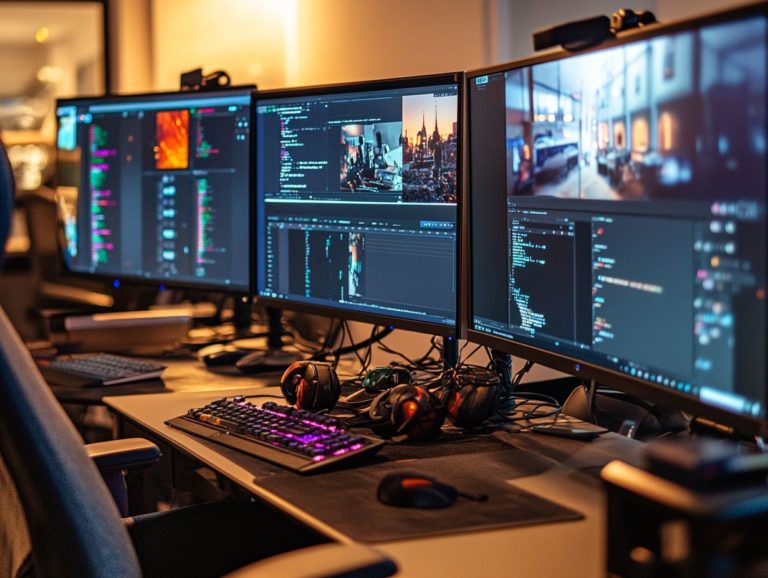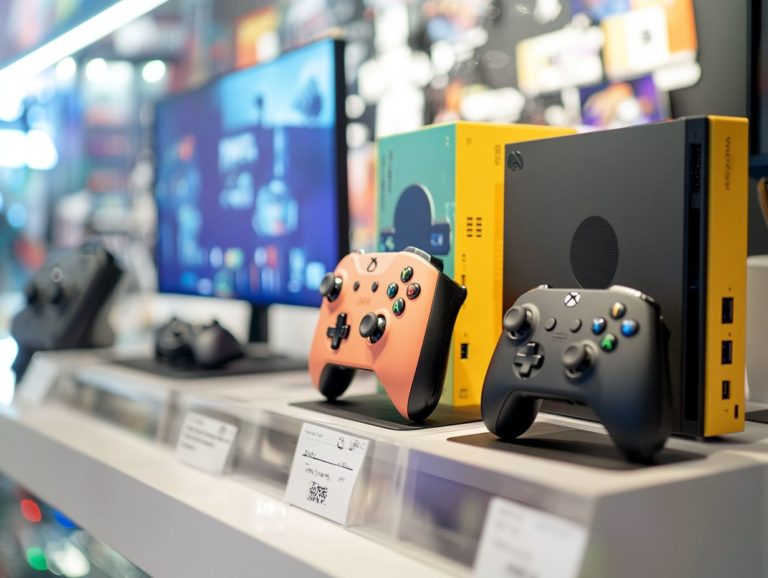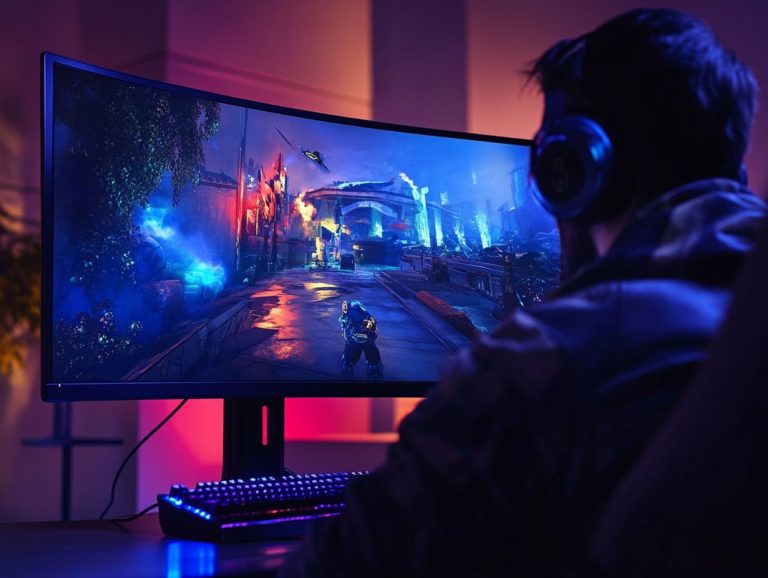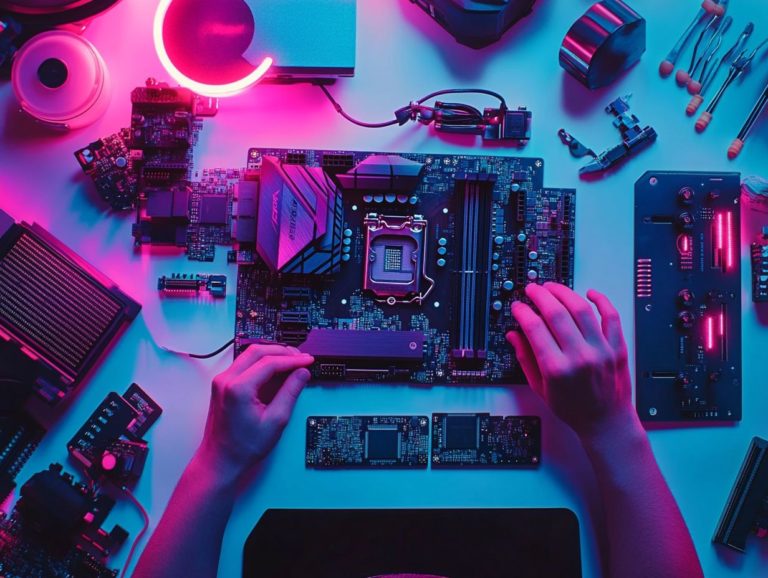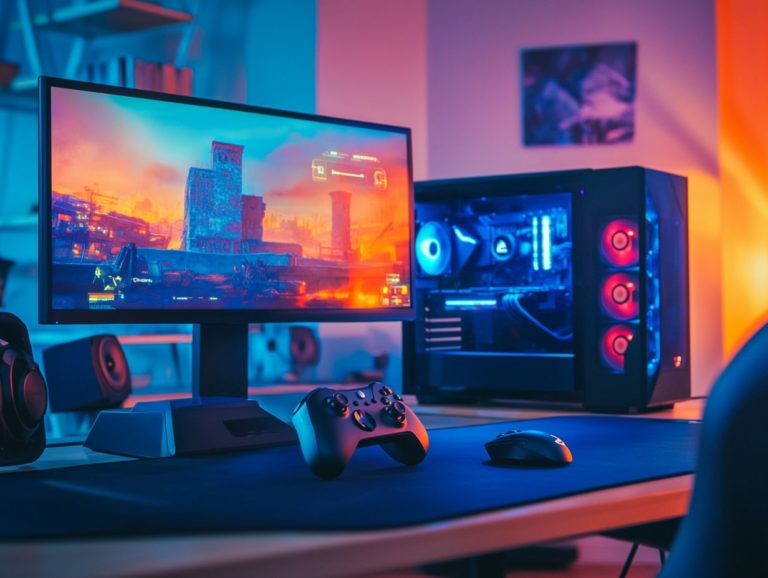what are the common misconceptions about gaming hardware?
Gaming hardware is often surrounded by myths that can mislead both newcomers and seasoned players alike.
You might believe that splurging on expensive gear automatically translates to superior performance or that PC gaming is an overly complicated and costly endeavor. Some may even assume that consoles offer an inferior gaming experience.
This article sets out to debunk those misconceptions, revealing the truths about gaming hardware while guiding you on how to select the right setup for your unique needs. Get ready to dive into the thrilling world of gaming with fresh insights!
Contents
- Key Takeaways:
- Common Misconceptions About Gaming Hardware
- The Truth About Gaming Hardware
- How to Choose the Right Gaming Hardware
- Factors to Consider for Your Gaming Needs
- Frequently Asked Questions
- What are the common misconceptions about gaming hardware?
- Is it necessary to have expensive hardware for good gaming performance?
- Are gaming consoles better than PCs for gaming?
- Do I need to upgrade my gaming hardware frequently?
- Is gaming hardware only for hardcore gamers?
- Can gaming hardware be used for other tasks besides gaming?
Key Takeaways:
- Expensive hardware does not always equal better gaming performance.
- Researching hardware specifications is crucial before purchasing.
- PC gaming can be affordable with options to build or buy pre-built systems.
- Consoles have unique advantages, including exclusive titles.
- Your ideal gaming hardware depends on your personal preferences.
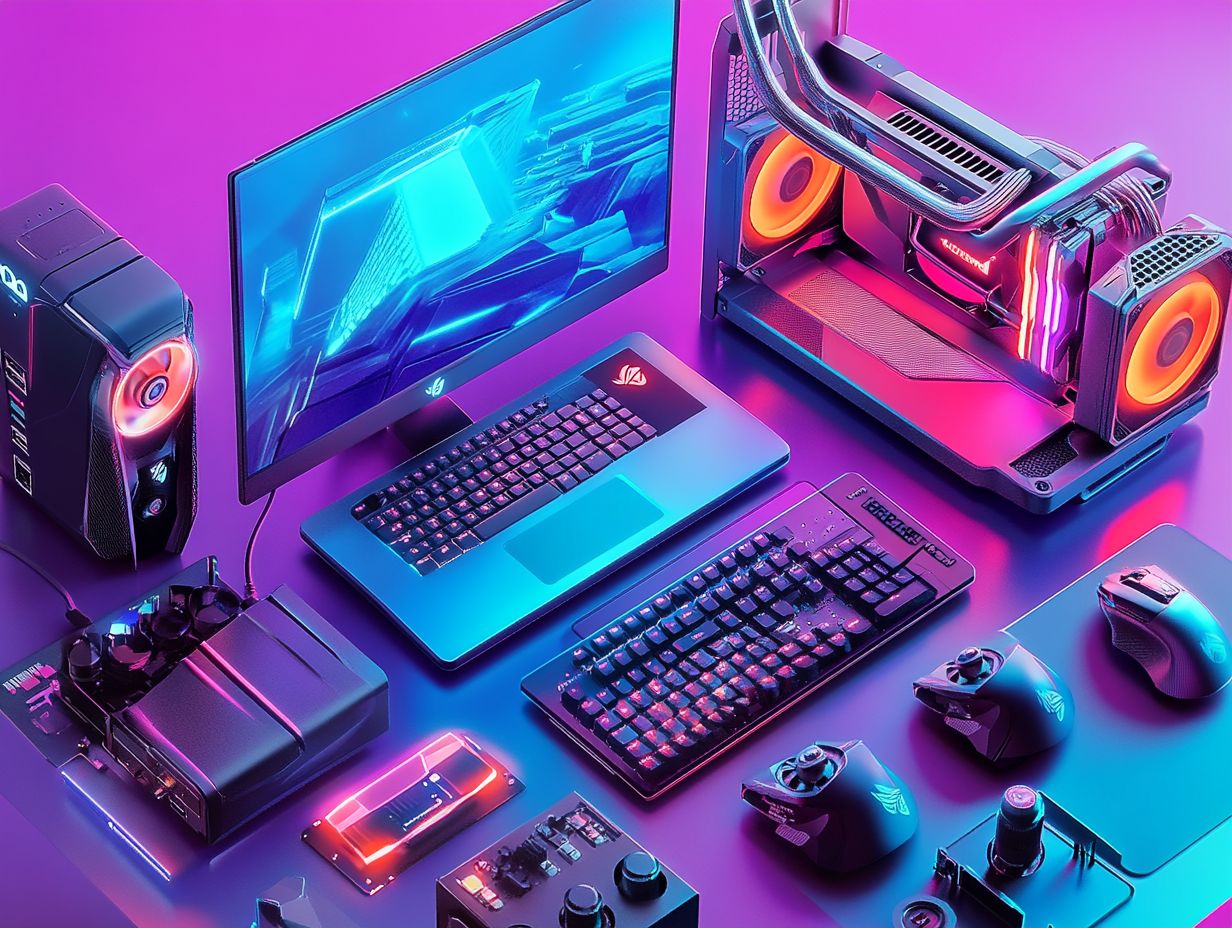
Defining Gaming Hardware
Gaming hardware consists of components and peripherals that significantly shape your PC’s performance and overall gaming experience. Whether you’re eyeing dedicated sound cards for pristine audio in your high-end setup or relying on integrated sound chips from most motherboards, your choices can dramatically impact game performance.
Key specifications like RAM speed and CPU clock frequency are essential, especially during intensive gaming or multitasking on a multimedia workstation. Grasping these elements gives you the power to make informed decisions for the ultimate setup.
Among these core components, the graphics processing unit (GPU) reigns supreme, playing a pivotal role in rendering images and managing graphics effects with finesse. Investing in a high-quality GPU can elevate your visual experience, delivering smoother frame rates and a more immersive journey into your favorite games.
Let s not forget the importance of cooling solutions. Whether it’s advanced airflow systems or liquid cooling setups, these innovations help prevent the system from slowing down when it gets too hot, ensuring your system maintains peak performance during those marathon gaming sessions.
Peripherals like gaming mice, keyboards, and VR headsets also enhance your responsiveness and situational awareness, fundamentally shaping how you engage with game worlds. By understanding the interplay between these components and peripherals, you can customize your gaming rig to perfectly align with your unique play style and preferences.
Common Misconceptions About Gaming Hardware
Embracing myths like “more expensive hardware always guarantees better performance” could lead you to make suboptimal choices, particularly when evaluating the capabilities of a multimedia PC or workstation PC.
It s essential to grasp the roles of the CPU, RAM, and the potential pitfalls of overclocking, as well as the bottlenecking risks that can emerge from mismatched components in your gaming setup.
Myth #1: Expensive Hardware Equals Better Performance
One of the most persistent myths in the gaming community is that shelling out for expensive hardware always guarantees top-notch performance. High-end audio setups and dedicated sound cards can enhance audio quality, but they won t automatically boost your gaming performance if other components lag behind.
A well-rounded system matters far more than simply chasing the priciest components on the market. Falling for this misconception can lead to budget cuts that skimp on essential parts like the CPU or RAM, both crucial for smooth gameplay. For example, if you invest heavily in a cutting-edge graphics card but pair it with an outdated processor, you might face frustrating bottlenecks.
Mid-range components can also provide an impressive gaming experience without the hefty price tag. Numerous benchmarks reveal how different setups stack up against each other, proving that you don t need to break the bank to achieve satisfaction.
By understanding how elements like graphics processing units, solid-state drives, and monitor refresh rates interact, you can make informed choices that elevate your gaming performance without emptying your wallet.
Myth #2: PC Gaming is Too Complicated and Expensive
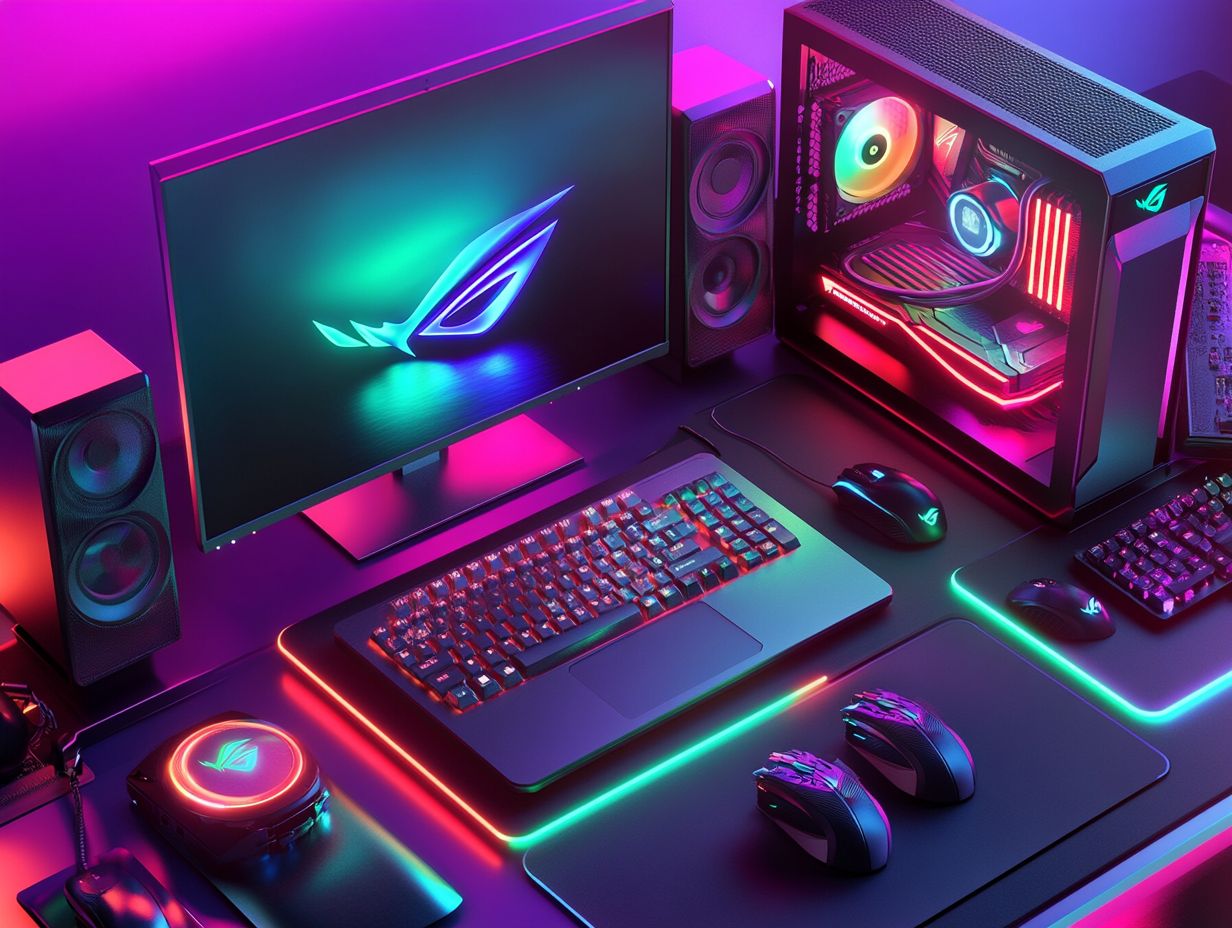
Another common myth suggests that PC gaming is inherently complicated and expensive, which keeps many potential gamers from diving in. In reality, a well-configured multimedia PC can be both affordable and equipped to deliver impressive gaming performance, opening the door to educational games and a variety of genres.
By debunking these myths, you can inspire more gamers to view PC gaming as a viable and enjoyable option. The notion that setting up a gaming PC requires deep technical knowledge often makes newcomers hesitate. However, many affordable pre-built systems from brands like HP and Dell are specifically designed for budget-conscious gamers.
These machines typically come with decent graphics cards and processors, making them powerful enough to handle popular games without straining your wallet. Plus, platforms like Steam and Epic Games frequently roll out sales and bundles that make purchasing games more economical, enhancing the overall value of PC gaming.
By shining a light on these accessible options, more individuals can appreciate the cost-effective nature of stepping into the PC gaming arena.
Myth #3: Consoles are Inferior to PCs for Gaming
The idea that consoles are somehow inferior to PCs for gaming is a myth we need to address right now. Sure, PCs boast flexibility and performance enhancements, but consoles are no slouches either.
They come with built-in sound systems and optimized onboard audio, delivering impressive audio and picture quality via HDMI cables. Each platform has unique strengths, making the discussion far more nuanced than a mere contest of superiority.
Consider the plug-and-play convenience that consoles offer. You can dive right into your favorite games without the hassle of constant updates or complex setups. On the flip side, PCs shine with their superior graphics capabilities, a wide range of compatibility options, and robust customization, especially regarding hardware upgrades.
Regarding connectivity, consoles typically ensure seamless integration with TVs and streaming devices, which is a big win for social gaming experiences. It’s crucial to evaluate these factors alongside the performance benchmarks each platform can achieve, as they significantly influence your overall enjoyment of gameplay in different ways.
The Truth About Gaming Hardware
Understanding the intricacies of gaming hardware is essential for you to make informed choices when building or upgrading your gaming setup. Performance benchmarks are pivotal in assessing the effectiveness of different components, whether it s dedicated sound cards that elevate audio quality or built-in sound systems that offer a robust foundation for your multimedia experiences.
Pay close attention to specifications such as RAM speed and CPU clock frequency, which affects how fast your computer can process instructions. These elements are crucial for preventing performance problems due to overclocking and ensuring a harmonious balance that optimizes your gaming performance.
By knowing the facts about gaming hardware, you can make smart choices that enhance your gaming experience.
Fact #1: Price Does Not Always Equal Performance
One undeniable fact to remember is that price doesn’t always match performance when it comes to gaming hardware. Investing in a dedicated sound card might enhance your audio quality, but its hefty price tag doesn t guarantee an elevated gaming experience. This is especially true if other components, like the brain of the computer and graphics processor, aren t up to par.
Performance benchmarks often show that mid-range options can deliver impressive results. These components are often far more cost-effective choices for gamers.
For example, a solid mid-range graphics card, such as the NVIDIA GeForce GTX 1660 Super, can provide outstanding frame rates in popular titles without putting a dent in your wallet. It frequently outperforms more expensive counterparts when you consider the overall balance of your system.
Many gamers choose these budget-friendly options because they offer a remarkable blend of performance and price. This can lead to a more immersive and responsive experience compared to high-end components, which might deliver diminishing returns in similar gaming scenarios.
Ultimately, crafting a thoughtful configuration that emphasizes synergy among your components can result in a more enjoyable gaming experience all without the need for extravagant spending.
Fact #2: PC Gaming Can Be Affordable and Accessible
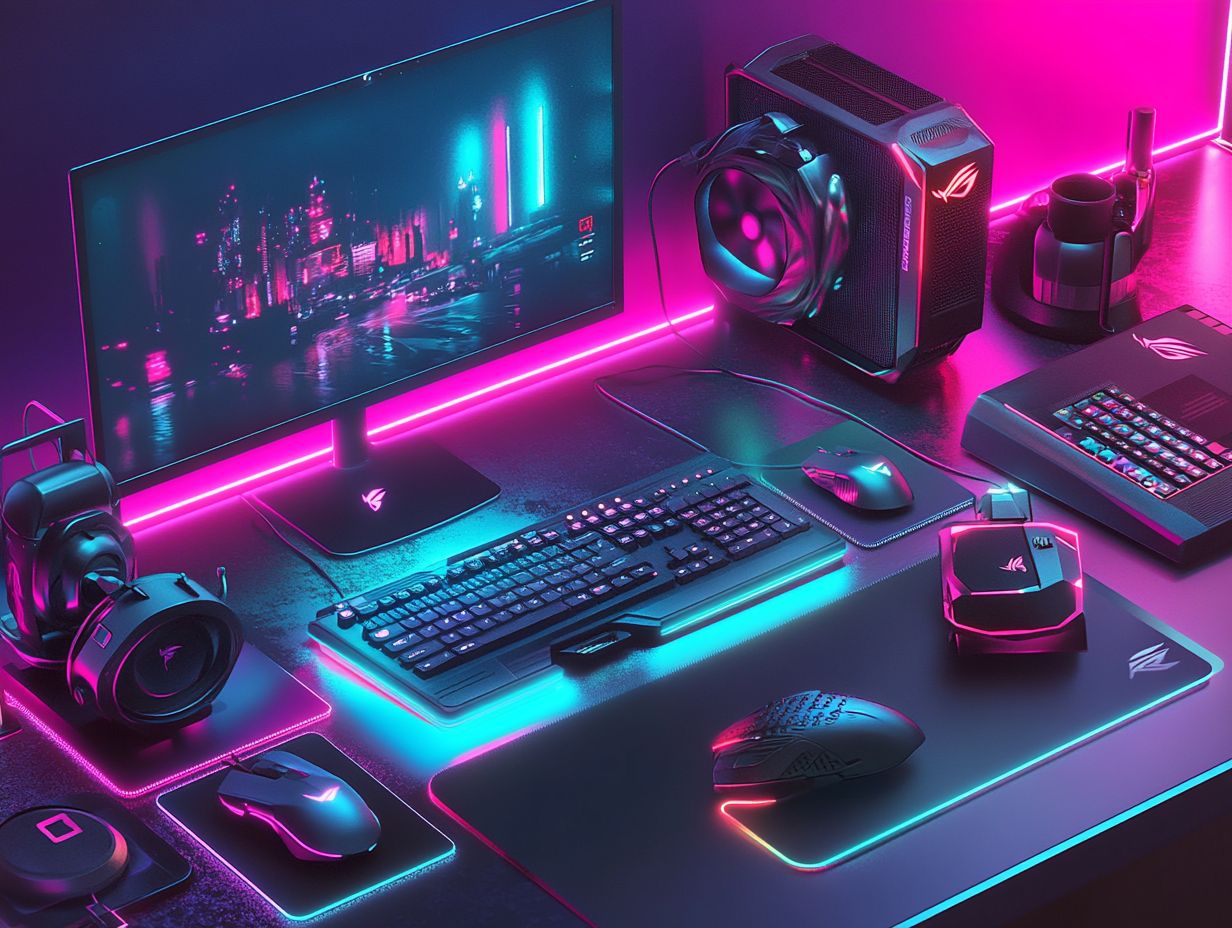
Great news! PC gaming is affordable and accessible for everyone, shattering common myths that suggest otherwise. With budget-friendly multimedia PCs now available, you can enjoy impressive gaming performance without draining your wallet.
Plus, the platform offers a variety of educational games, making it appealing to a broad audience.
Thanks to technological advancements, you can either build your own gaming system or choose from reputable pre-built models that fit any budget.
Don t miss out on the fantastic deals available on online marketplaces for essential components like graphics cards, processors, and motherboards. This allows you to customize your setup to your heart’s content.
Platforms like Steam and the Epic Games Store often run sales, giving you access to a vast library of games at a fraction of the original price.
With these innovations, the gaming experience has become not only more engaging but also remarkably attainable for everyone.
Fact #3: Consoles Have Advantages for Gaming
It s important to recognize that consoles bring unique advantages to gaming that can elevate your experience. With features like standardized hardware and integrated sound chips for consistently high audio quality, consoles provide a user-friendly alternative. This helps alleviate issues such as social isolation often linked to gaming.
The dedicated online gaming infrastructure encourages community interaction. You can connect, team up, and engage in multiplayer modes with ease. This sense of community is further enhanced by exclusive titles that showcase stunning graphics and immersive storytelling, delivering experiences that are not only entertaining but also socially enriching.
Robust parental controls ensure a safer environment for younger audiences, making consoles a practical choice for families. These distinctive features come together to foster an engaging and enjoyable gaming atmosphere, transforming a simple pastime into a shared adventure.
How to Choose the Right Gaming Hardware
Selecting the right gaming hardware is crucial for anyone eager to elevate their gaming experience. By carefully evaluating performance benchmarks and understanding the significance of components such as dedicated sound cards, RAM speed, and CPU clock frequency, you can make informed choices that profoundly impact your gaming performance.
Customizing your hardware to suit your unique needs guarantees a satisfying and immersive experience across a diverse range of game genres.
Factors to Consider for Your Gaming Needs
When selecting gaming hardware, several factors should be considered to ensure it aligns perfectly with your gaming needs. Evaluating performance benchmarks is crucial, as well as weighing the benefits of a dedicated sound card against integrated options.
Understanding RAM speed and CPU clock frequency can significantly enhance your gaming experience and satisfaction. Graphics options also play a pivotal role.
For example, deciding between NVIDIA and AMD graphics cards, or determining if ray tracing a feature that improves the way light and shadows look in games is essential for your favorite titles, can greatly improve visual quality.
Budget is also an important factor; high-end hardware can escalate in cost quickly. It’s wise to consider future-proofing your setup.
By choosing components that can handle upcoming games without requiring immediate upgrades, you can keep your gaming experience fresh and exciting for years to come! Don t overlook compatibility when selecting different parts, such as motherboards and processors.
Ensuring these components work seamlessly together will create a gaming setup tailored specifically to your preferences.
Frequently Asked Questions
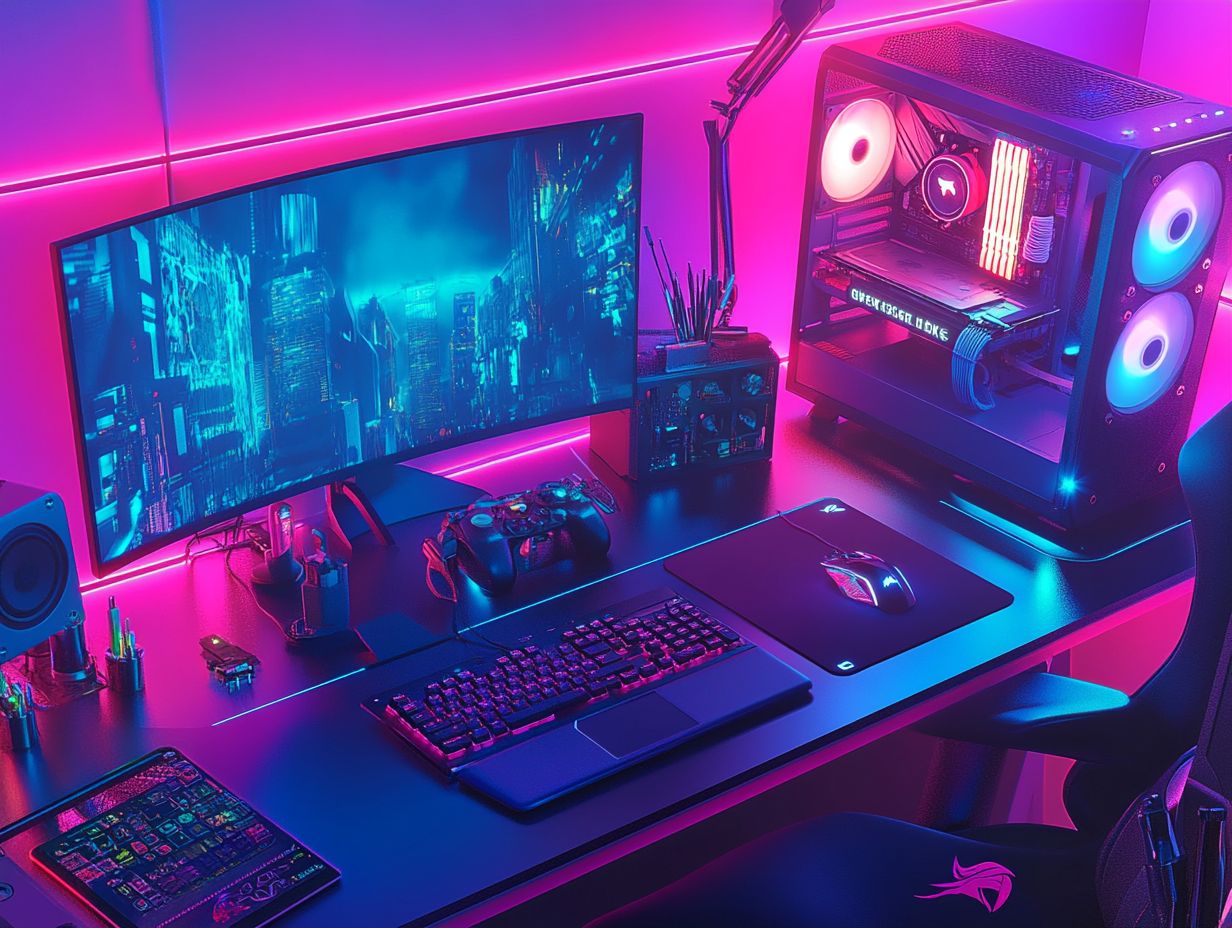
What are the common misconceptions about gaming hardware?
Some common misconceptions include the belief that expensive hardware equates to better gaming performance, that gaming consoles are superior to PCs, and that gaming hardware is solely for hardcore gamers.
Is it necessary to have expensive hardware for good gaming performance?
No, it is not necessary to have expensive hardware for good gaming performance. While high-end hardware may offer better performance, budget-friendly options can still provide a great gaming experience.
Are gaming consoles better than PCs for gaming?
This is a common misconception. While consoles may have exclusive games, PCs can offer better graphics, customizable hardware, and a wider range of gaming options.
Do I need to upgrade my gaming hardware frequently?
Not necessarily. Although technology advances and newer hardware may provide better performance, it is not always necessary to upgrade frequently. It ultimately depends on your gaming needs and preferences.
Is gaming hardware only for hardcore gamers?
No, gaming hardware can be enjoyed by gamers of all levels. Whether you are a casual or hardcore gamer, quality gaming hardware can enhance your experience.
Can gaming hardware be used for other tasks besides gaming?
Yes, gaming hardware can be used for other tasks as well. Many high-performance gaming computers can handle demanding tasks such as video editing, graphic design, and 3D rendering.

